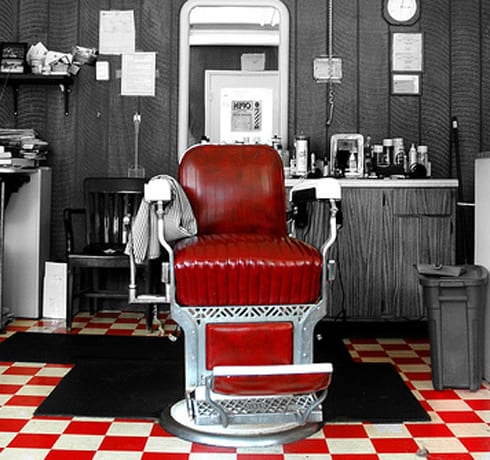LIVING in another country is vastly different to holidaying in another country.
All expats know this, though the contrast may not seem so dissimilar on the surface – there is, after all, enough sun, sand and sangria here in Spain to suggest otherwise (at times) – but eventually, every expat, whether in Spain or any other foreign country, realizes that they have to build a life; find a place to live, make new friends, get used to the local fodder and, worst of all, get their hair cut.
This daunting task is obviously a lot easier after a few months of tussling with the local lingo, but initially, the anxiety brought on by the notion of relinquishing control over your wildly overgrown barnet to a person with whom you cannot so much as discuss the weather can be enough to put you off your paella for weeks. And if that’s not serious then I don’t know what is.
If the proper steps aren’t taken, then consequences can be disastrous; the mullet, for example, still very much lives and breathes in Spain, as does the army-style crewcut. I fell victim to the latter days after my arrival in 2010. I had learnt the words for ‘short’ and ‘long’ but foolishly forgotten to write them down, giving rise to inevitable confusion and a sort of Spongebob squarepants look that I’d never sported before.
This experience left me justifiably wary of Spanish barbers, so for the next year or so I opted to cut my own hair, which, in hindsight, was an even worse decision, owing to the frequent hunks of hair visibly missing from the back of my gauchely beshaven bonce.
Earlier this year, however, I waltzed back in to a nearby peloquería, confident that I possessed sufficient Spanish to help me through the impending ordeal. Fortunately, I did, and I eluded another coiffure cataclysm. Now I am on first name terms with my gabby barber, and a simple ‘lo mismo como siempre’ is all I need to say.
Though if I look back on that first dismaying encounter, I can’t help but think that with a bit of expert guidance and some thorough planning, my resulting Spongebob bouffant might have been successfully averted…
So if you’re new in Spain, or in any other foreign land for that matter, and your locks are in need of a good sheering, then heed my advice:
One: Learn some useful phrases and write them down
Do this and the risk of adversity will be considerably reduced. Pronunciation may be an issue, but if you’re really unsure then simply show your barber what you’ve written. You could even get a local friend to translate exactly what you want to say onto paper, though ensure that this friend can be trusted; you wouldn’t want to get stitched up and be the laughing stock. Some useful phrases:
“Me gustaría un corte de pelo por favor” – “I’d like a haircut please”
“Corto por los lados y de atras, pero mas largo en la parte de ariba por favor” – “Short round the back and sides but longer on top”
“Solo un recorte por favor” – “Just a trim please”
“Está bien asi?” – “Is it fine like that?”
“Si, está bien asi” – “Yes, it’s fine like that / No, it’s not fine like that, but I’m going to pretend it is and swear all the way home”
Two: Cut out a picture from a magazine
If your style can be likened to any celebrity hairdos, you may want to take one or two magazine clippings with you. This keeps things simple and, needless to say, completely eradicates the necessity of words. However, this is neither culturally embracing nor healthy for your language skills. And there’s no telling what the back will look like.
Three: Look serious and don’t talk
Following the initial verbal hurdles, one then has two options; proceed, and try in vain to understand and contribute to the chosen topic of conversation, or sit down, look dead ahead and keep schtum. This latter route could significantly heighten your chances of leaving the place unmarred, assuming that the barber, upon noting your unwillingness to engage in feeble small talk, will inadvertently become quietly engrossed in what he or she is doing and therefore be less prone to mistakes or overzealous snipping.
Four: Ask for something simple
If back at home your usual chop involves blending, thinning out, colouring, straightening etc, then you may want to rethink your style abroad. Throwing technical words like this into the mix only complicates matters, and leaves you wide open to potentially perilous consequences. Start small and work your way up.
Five: Take a friend
If you have nice, local friends with enough free time on their hands, then try and bring them along. This eliminates the possibility of having to contend with unforeseen questions and accidentally agreeing to a number one all over or, heaven forbid, the famed dreadlock mullet.
Six: Get drunk
If the idea of leaving your precious head of hair in the hands of a non-English speaking barber really does give you the heebie-jeebies, then you might find that a generous pre-intake of alcohol will help alleviate your concerns. And of course everybody speaks better Spanish when they’re drunk. That’s just science.












I’ve lost count of the times Ive come out of an English hairdresser’s with something I didn’t want!! We have managed quite well here in Spain, and the price is aroung half the English equivalent. Don’t assume everyone who arrives in Spain is totally stupid/cannot speak the language etc etc…
i must have some very special hair indeed. don’t know why, but my ‘military cut’ of 3 and 6 cms at sides/back and top respectively always presents a problem when visiting a hairdresser the first couple of times. thing is, you need to run over it twice; once before, and another time after cutting and washing it.
anyway, here, in spain, i haven’t had more problems than usual; except with a cuban hairdresser in benalmadena – in his case i had to opt for “Si, está bien asi” – No, it’s not fine like that, but I’m going to pretend it is and swear all the way home” after about 1 hour of working on a 15 minute cut…
i suppose there are folks out there that simply want to see everybody dead…
Have many people who live in Spain can not speaking Spanish. I thinking can be quiet hard, I know that. This happend with me in the past when move to England. I need to go University x 3 years.
Despite the recession and a lack of disposable income, the Spanish always seem to have enough money available for three essential things: 1) the latest smart phone; 2) cigarettes and of course most importantly 3) manicures, pedicures and haircuts. lol.
I asked someone who’s hair I liked, the person very kindly phoned the hairdresser, then took me in her car, came in with me told the hairdresser what I wanted then left. I was very pleased ,the hairdresser then offered to take me home in her car all for 12 Euros. Fantastic service. Patricia Alameda Spain